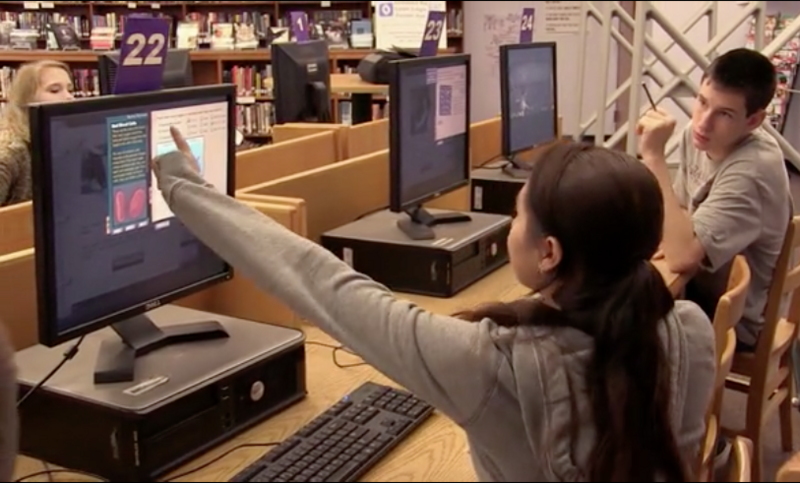September 1, 2017
Lessons for life (and career)
UGA startup Cogent Education is turning students into scientific problem solvers

Something’s wrong with Anthony.
His legs and ankles are swollen; there’s pressure in his chest. Breathing has become difficult. It’s getting harder to stay awake.
His doctor orders an X-ray and blood sample, which reveals the diagnosis – Anthony’s kidneys are failing. He’ll need dialysis.
Unfortunately, the dialysis machine doesn’t seem to be doing its job. The doctor has to figure out why – so he flies into the dialysis machine to troubleshoot the problem.
All of this really happened, right down to the doctor entering the machine. It happened virtually, through 3D interactive software developed at the University of Georgia.
The doctor was controlled by a team of high school students – they made his decisions and took action on his behalf in a series of situations that look a lot like real life. In the case of Anthony the patient, the software depicts everything from analyzing his blood test to determining the correct “pore size” inside the dialysis machine.
The software was developed eight years ago at UGA, and it’s now being marketed through Cogent Education, a startup receiving early-stage funding from GRA. Cogent’s interactive case studies take learning to a new level. Students – from middle school through college – explore the world of science by role-playing as professional scientists within a video game environment.
Which makes sense, considering game developers partnered with teachers and expert science educators to develop the software.
“We went to the teacher and said, ‘Tell us where it hurts in the curriculum,’” says Tom Robertson, formerly an associate professor of physiology and pharmacology who co-founded Cogent Education. “Students don’t often understand what a career in science looks like. We want to give them the opportunity to play the role of scientists and help them learn the very difficult concepts and skills they need for successful careers.”
In one case study, students play the role of a veterinary neurologist charged with helping a dog named Marcie, which is suffering from tremors and having trouble standing up. At the heart of the case study is the complex subject of cell signaling, and students hypothesize what’s wrong with Marcie. Then they perform experiments, study data and prescribe treatment.
Student roles in other case studies range from a nurse practitioner treating a young woman who’s had too many energy drinks to a marine biologist investigating coral bleaching on Australia’s Great Barrier Reef.
“Knowing facts about science will not get you a job,” Robertson says, “but knowing what to do with data and knowing how to solve a problem will. This kind of approach is what the economy needs as well as what will improve education.”
Holly Amerman, who coordinates STEM education and the gifted program for Rome City Schools in Rome, Ga, agrees. “We've imagined in our heads what it looks like to fly into a vein and see blood cells floating through it, or we imagine what mitochondria looks like,” Amerman says in one of Cogent’s testimonial videos. “But now we can actually see it and visualize it more. My students were just absolutely enthralled by the experience.”
Particularly impressive is how teachers track student progress: An embedded assessment tool allows them to see which concepts or skills are confounding individual students. So they’re able to intervene immediately to reinforce key concepts and lessons.
As a company, Cogent Education is a rising star. In May 2016, AT&T picked it as one of six startups in the U.S. to join its Aspire Accelerator class for educational technology. The selection came with a $100,000 investment and ready access to experts inside and outside AT&T. The company has also captured awards and generated notable media coverage.
Most important, it’s the kind of enterprise poised to change education and, ultimately, the workforce.
“Life isn’t a multiple-choice test,” Robertson says. “It’s about finding and solving problems and focusing on critical thinking. It doesn’t matter if you don’t end up being a scientist. You’ve got those skills on board.”
Here's a video with more about Cogent Education:
